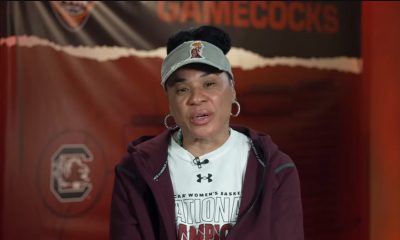National
Trump rechaza número de muertes de María en Puerto Rico
Los comentarios provocan indignación entre activistas LGBTI
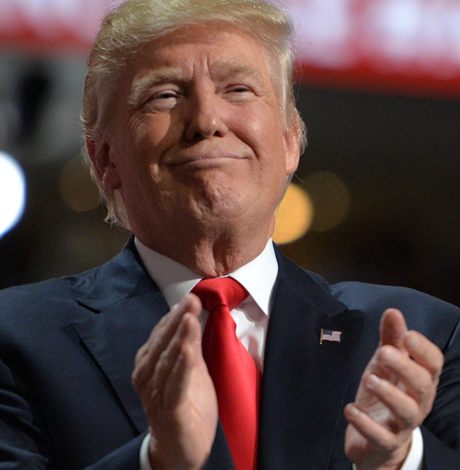
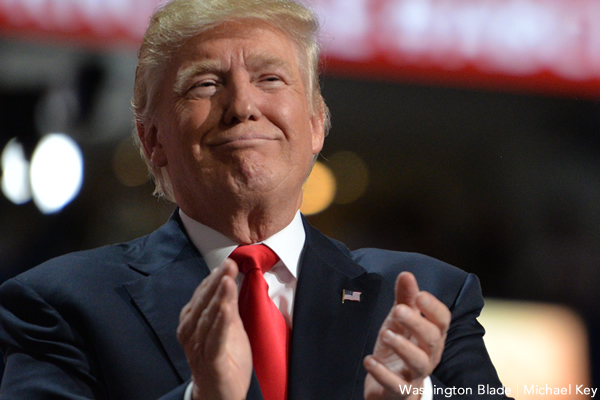
El presidente Trump el 13 de septiembre provocó indignación cuando rechazó el número de muertes del huracán María en Puerto Rico (Foto de Washington Blade por Michael Key)
“3,000 personas no murieron en los dos huracanes que golpearon Puerto Rico,” dijo Trump en uno de sus dos tweets, refiriéndose a María, que tocó tierra en la costa sureste de Puerto Rico el 20 de septiembre de 2017, y el huracán Irma, que rozó el estado libre asociado estadounidense menos de dos semanas antes. “Cuando salí de la isla, después de que la tormenta había golpeado, tenían entre seis y 18 muertos. No subió demasiado con el paso del tiempo. Luego, mucho tiempo después comenzaron a reportar números realmente grandes, como 3,000.”
3000 people did not die in the two hurricanes that hit Puerto Rico. When I left the Island, AFTER the storm had hit, they had anywhere from 6 to 18 deaths. As time went by it did not go up by much. Then, a long time later, they started to report really large numbers, like 3000…
— Donald J. Trump (@realDonaldTrump) September 13, 2018
Trump en otro tweet acusó a los demócratas de inflar el número de muertes “para hacer que mirase lo peor posible cuando estaba recaudando miles de millones de dólares para ayudar a reconstruir Puerto Rico.”
“Si una persona murió por cualquier motivo, como la vejez, simplemente agréguela a la lista,” dijo Trump. “Malas políticas. Amo a Puerto Rico.”
…..This was done by the Democrats in order to make me look as bad as possible when I was successfully raising Billions of Dollars to help rebuild Puerto Rico. If a person died for any reason, like old age, just add them onto the list. Bad politics. I love Puerto Rico!
— Donald J. Trump (@realDonaldTrump) September 13, 2018
Trump hizo sus comentarios menos de tres semanas después del gobernador de Puerto Rico Ricardo Rosselló aceptó los hallazgos de un estudio de la Universidad George Washington que atribuyó 2,975 muertos a María. Trump estaba twitteando mientras el huracán Florence comenzaba a azotar la costa de Carolina del Norte.
“Las declaraciones del presidente que cuestionan el número de muertes de los huracanes Irma y María son deplorables,” Omar Gonzalez-Pagan, un abogado para Lambda Legal que es puertorriqueño, dijo al Washington Blade el jueves desde la capital puertorriqueña de San Juan. “Demuestran que el presidente no solo está divorciado de la realidad, sino también su absoluta indiferencia por el sufrimiento de la gente y, francamente, su crueldad.”
“Casi 3,000 puertorriqueños murieron como resultado de los huracanes María e Irma,” añadió. “Sus vidas cuentan.”
Wilfred Labiosa, cofundador de Waves Ahead, un grupo que ayuda a los puertorriqueños LGBTI y otros grupos vulnerables recuperarse de María, estuvo de acuerdo con Gonzalez-Pagan cuando habló al Blade el jueves desde Puerto Rico. Labiosa añadió que los tweets de Trump “reflectan la falta de aceptación de puertorriqueños como ciudadanos estadounidenses.”
“Refleja que Puerto Rico no es un estado libre asociado, sino una colonia de los EEUU que podemos ser prescindibles para los EEUU,” Labiosa dijo al Blade.
La alcaldesa de San Juan Carmen Yulín Cruz es entre aquellos que siguen ser críticas vocales de la respuesta de Trump a María, que incluyó tirando papel toallas en una multitud de personas en una iglesia en las afueras de San Juan menos de dos semanas después del huracán tocó tierra. Cruz el jueves en una larga declaración dijo que las declaraciones de Trump muestran “una falta de respeto por nuestra realidad y nuestro dolor.”
“El simplemente no puede comprender el sufrimiento humano que su negligencia y falta de sensibilidad nos han causado,” dijo Cruz. “3,000 personas murieron en su vigilancia y su incapacidad de captarlo (es lo que) lo vuelven peligroso.”
Rosselló, que han sido reacio a criticar a Trump, también rechazó los tweets.
“Ni la gente de Puerto Rico ni las víctimas merecen que su dolor sea cuestionado,” Rosselló dijo a CBS News.
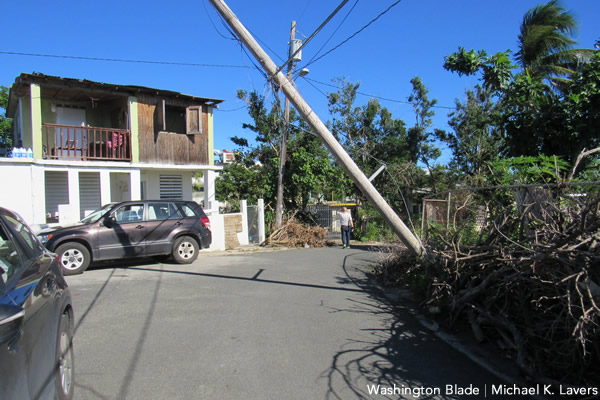
Un poste dañado en un barrio de Vieques, Puerto Rico, el 31 de enero de 2018. (Foto de Washington Blade por Michael K. Lavers)
Trump ‘dándole la espalda a todos los que sufren’
María tuvo vientos de 155 mph cuando tocó tierra.
Cientos de miles de puertorriqueños no tenían electricidad o acceso a agua potable durante meses.
Labiosa y otros activistas en Puerto Rico han dicho al Blade que personas con VIH/SIDA no tenían acceso a medicamentos antiretrovirales durante los días y semanas después de María tocó tierra. También han dicho que los puertorriqueños confrontaron discriminación en albergues de emergencia por toda la isla.
Casas con toldos azules como techos temporales todavía eran comunes en la zona metropolitana de San Juan y en el sureste de Puerto Rico en mayo cuando este reportero estuvo en la isla.
David Begnaud, un reportero de CBS News, el jueves reportó FEMA dijo que se mudó millones de botellas de agua a una vieja pista en Ceiba, un municipio en la costa noreste de Puerto Rico, que fueron fotografiadas esta semana con toldos azules resistidos sobre ellas.
BREAKING: FEMA accepts blames, admits it DID move water onto a runway in Ceiba, Puerto Rico in order to save taxpayer money.
I was told @FEMA didn’t have available space on the island to store the millions of bottles of water, so it sat tarped in the sun.https://t.co/4gopvepV3Y— David Begnaud (@DavidBegnaud) September 13, 2018
BuzzFeed el martes reportó que FEMA solo aprovechó 75 de las 2,431 solicitudes de asistencia funeraria que recibió de puertorriqueños después de María. Trump en el mismo día defendió de nuevo la respuesta de su administración a María mientras hablaba sobre Florence con reporteros a la Casa Blanca.
“Mientras está ocupado tratando de ‘salvar la cara,’ continuará dándole la espalda a todos los que sufren,” dijo Cruz el jueves en su declaración. “En pocas palabras: Está completamente desquiciado de la realidad. Una cosa es segura, nuestras vidas importan y no necesitamos un tweet de Trump para recordarnos eso.”
Labiosa estaba de acuerdo, notando que su organización y otras todavía están ayudando a los puertorriqueños recuperarse de María e Irma. Labiosa también dijo al Blade que Waves Ahead, SAGE Puerto Rico y otros grupos que dan la asistencia a puertorriqueños LGBTI también están trabajando de responder a la creciente crisis de salud mental de la isla.
“La comunidad, la diáspora y las entidades no gubernamentales están haciendo la diferencia por trabajar duras para dar los servicios necesarios a aquellos devastados por los huracanes,” dijo al Blade.
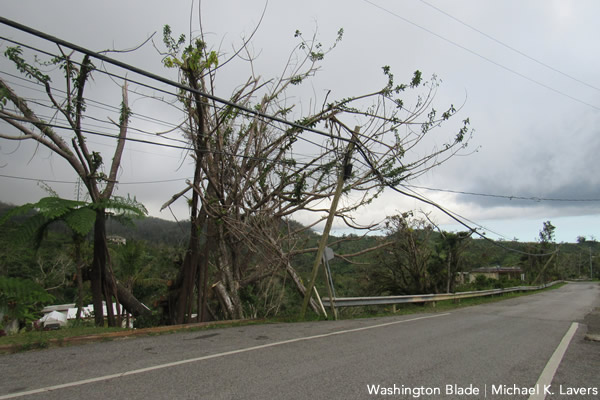
Un poste y árboles dañados en Adjuntas, Puerto Rico, el 2 de febrero de 2018. (Foto de Washington Blade de Michael K. Lavers)
The White House
Four states to ignore new Title IX rules protecting transgender students
Biden administration last Friday released final regulations

BY ERIN REED | Last Friday, the Biden administration released its final Title IX rules, which include protections for LGBTQ students by clarifying that Title IX forbids discrimination based on sexual orientation and gender identity.
The rule change could have a significant impact as it would supersede bathroom bans and other discriminatory policies that have become increasingly common in Republican states within the U.S.
As of Thursday morning, however, officials in at least four states — Oklahoma, Louisiana, Florida, and South Carolina — have directed schools to ignore the regulations, potentially setting up a federal showdown that may ultimately end up in a protracted court battle in the lead-up to the 2024 elections.
Louisiana State Superintendent of Education Cade Brumley was the first to respond, decrying the fact that the new Title IX regulations could block teachers and other students from exercising what has been dubbed by some a “right to bully” transgender students by using their old names and pronouns intentionally.
Asserting that Title IX law does not protect trans and queer students, Brumley states that schools “should not alter policies or procedures at this time.” Critically, several courts have ruled that trans and queer students are protected by Title IX, including the 4th U.S. Circuit Court of Appeals in a recent case in West Virginia.
In South Carolina, Schools Supt. Ellen Weaver wrote in a letter that providing protections for trans and LGBTQ students under Title IX “would rescind 50 years of progress and equality of opportunity by putting girls and women at a disadvantage in the educational arena,” apparently leaving trans kids out of her definition of those who deserve progress and equality of opportunity.
She then directed schools to ignore the new directive while waiting for court challenges. While South Carolina does not have a bathroom ban or statewide “Don’t Say Gay or Trans” law, such bills continue to be proposed in the state.
Responding to the South Carolina letter, Chase Glenn of Alliance For Full Acceptance stated, “While Supt. Weaver may not personally support the rights of LGBTQ+ students, she has the responsibility as the top school leader in our state to ensure that all students have equal rights and protections, and a safe place to learn and be themselves. The flagrant disregard shown for the Title IX rule tells me that our superintendent unfortunately does not have the best interests of all students in mind.”
Florida Education Commissioner Manny Diaz also joined in instructing schools not to implement Title IX regulations. In a letter issued to area schools, Diaz stated that the new Title IX regulations were tantamount to “gaslighting the country into believing that biological sex no longer has any meaning.”
Governor Ron DeSantis approved of the letter and stated that Florida “will not comply.” Florida has notably been the site of some of the most viciously anti-queer and anti-trans legislation in recent history, including a “Don’t Say Gay or Trans” law that was used to force a trans female teacher to go by “Mr.”
State Education Supt. Ryan Walters of Oklahoma was the latest to echo similar sentiments. Walters has recently appointed the right-wing media figure Chaya Raichik of Libs of TikTok to an advisory role “to improve school safety,” and notably, Raichik has posed proudly with papers accusing her of instigating bomb threats with her incendiary posts about LGBTQ people in classrooms.
The Title IX policies have been universally applauded by large LGBTQ rights organizations in the U.S. Lambda Legal, a key figure in fighting anti-LGBTQ legislation nationwide, said that the regulations “clearly cover LGBTQ+ students, as well as survivors and pregnant and parenting students across race and gender identity.” The Human Rights Campaign also praised the rule, stating, “rule will be life-changing for so many LGBTQ+ youth and help ensure LGBTQ+ students can receive the same educational experience as their peers: Going to dances, safely using the restroom, and writing stories that tell the truth about their own lives.”
The rule is slated to go into effect Aug. 1, pending any legal challenges.
****************************************************************************

Erin Reed is a transgender woman (she/her pronouns) and researcher who tracks anti-LGBTQ+ legislation around the world and helps people become better advocates for their queer family, friends, colleagues, and community. Reed also is a social media consultant and public speaker.
******************************************************************************************
The preceding article was first published at Erin In The Morning and is republished with permission.
Pennsylvania
Malcolm Kenyatta could become the first LGBTQ statewide elected official in Pa.
State lawmaker a prominent Biden-Harris 2024 reelection campaign surrogate

Following his win in the Democratic primary contest on Wednesday, Pennsylvania state Rep. Malcolm Kenyatta, who is running for auditor general, is positioned to potentially become the first openly LGBTQ elected official serving the commonwealth.
In a statement celebrating his victory, LGBTQ+ Victory Fund President Annise Parker said, “Pennsylvanians trust Malcolm Kenyatta to be their watchdog as auditor general because that’s exactly what he’s been as a legislator.”
“LGBTQ+ Victory Fund is all in for Malcolm, because we know he has the experience to win this race and carry on his fight for students, seniors and workers as Pennsylvania’s auditor general,” she said.
Parker added, “LGBTQ+ Americans are severely underrepresented in public office and the numbers are even worse for Black LGBTQ+ representation. I look forward to doing everything I can to mobilize LGBTQ+ Pennsylvanians and our allies to get out and vote for Malcolm this November so we can make history.”
In April 2023, Kenyatta was appointed by the White House to serve as director of the Presidential Advisory Commission on Advancing Educational Equity, Excellence and Economic Opportunity for Black Americans.
He has been an active surrogate in the Biden-Harris 2024 reelection campaign.
The White House
White House debuts action plan targeting pollutants in drinking water
Same-sex couples face higher risk from environmental hazards

Headlining an Earth Day event in Northern Virginia’s Prince William Forest on Monday, President Joe Biden announced the disbursement of $7 billion in new grants for solar projects and warned of his Republican opponent’s plans to roll back the progress his administration has made toward addressing the harms of climate change.
The administration has led more than 500 programs geared toward communities most impacted by health and safety hazards like pollution and extreme weather events.
In a statement to the Washington Blade on Wednesday, Brenda Mallory, chair of the White House Council on Environmental Quality, said, “President Biden is leading the most ambitious climate, conservation, and environmental justice agenda in history — and that means working toward a future where all people can breathe clean air, drink clean water, and live in a healthy community.”
“This Earth Week, the Biden-Harris Administration announced $7 billion in solar energy projects for over 900,000 households in disadvantaged communities while creating hundreds of thousands of clean energy jobs, which are being made more accessible by the American Climate Corps,” she said. “President Biden is delivering on his promise to help protect all communities from the impacts of climate change — including the LGBTQI+ community — and that we leave no community behind as we build an equitable and inclusive clean energy economy for all.”
Recent milestones in the administration’s climate policies include the U.S. Environmental Protection Agency’s issuance on April 10 of legally enforceable standard for detecting and treating drinking water contaminated with polyfluoroalkyl substances.
“This rule sets health safeguards and will require public water systems to monitor and reduce the levels of PFAS in our nation’s drinking water, and notify the public of any exceedances of those levels,” according to a White House fact sheet. “The rule sets drinking water limits for five individual PFAS, including the most frequently found PFOA and PFOS.”
The move is expected to protect 100 million Americans from exposure to the “forever chemicals,” which have been linked to severe health problems including cancers, liver and heart damage, and developmental impacts in children.
An interactive dashboard from the United States Geological Survey shows the concentrations of polyfluoroalkyl substances in tapwater are highest in urban areas with dense populations, including cities like New York and Los Angeles.
During Biden’s tenure, the federal government has launched more than 500 programs that are geared toward investing in the communities most impacted by climate change, whether the harms may arise from chemical pollutants, extreme weather events, or other causes.
New research by the Williams Institute at the UCLA School of Law found that because LGBTQ Americans are likelier to live in coastal areas and densely populated cities, households with same-sex couples are likelier to experience the adverse effects of climate change.
The report notes that previous research, including a study that used “national Census data on same-sex households by census tract combined with data on hazardous air pollutants (HAPs) from the National Air Toxics Assessment” to model “the relationship between same-sex households and risk of cancer and respiratory illness” found “that higher prevalence of same-sex households is associated with higher risks for these diseases.”
“Climate change action plans at federal, state, and local levels, including disaster preparedness, response, and recovery plans, must be inclusive and address the specific needs and vulnerabilities facing LGBT people,” the Williams Institute wrote.
With respect to polyfluoroalkyl substances, the EPA’s adoption of new standards follows other federal actions undertaken during the Biden-Harris administration to protect firefighters and healthcare workers, test for and clean up pollution, and phase out or reduce use of the chemicals in fire suppressants, food packaging, and federal procurement.
-

 State Department4 days ago
State Department4 days agoState Department releases annual human rights report
-

 District of Columbia2 days ago
District of Columbia2 days agoCatching up with the asexuals and aromantics of D.C.
-

 South America2 days ago
South America2 days agoArgentina government dismisses transgender public sector employees
-

 Politics5 days ago
Politics5 days agoSmithsonian staff concerned about future of LGBTQ programming amid GOP scrutiny



